- About Us
- learn about fsgb
- Vision
- Mission
- History
- Family Service in Action
- Chief Executive Officer
- Board of Trustees
For More Information Contact:
Center for Behavioral Health: 617.523.6400
Family Based and Youth Services: 617.523.6400
Family Independence Teen Living Program: 617.541.0944, or 617.427.9966
Family Service in Action
Posted Wednesday, Decemeber 19, 2012
Family Service of Greater Boston offers our deepest condolences to the families and loved ones of the Sandy Hook Elementary School shooting victims, and the entire community of Newtown, Connecticut.
As we move forward in our work, we know that too many children and families face violence, trauma and loss. And we know that more resources are needed to provide increased depth and access of family support and behavioral health.
Here are some resources about how to talk to children about the tragedy:
http://www.pbs.org/parents/rogers/special/scarynews-thoughts.html
http://www.apa.org/topics/violence/school-shooting.aspx
Here are some helpful resources from the National Association of School Psychologists:
Talking to Children About Violence: Tips for Parents and Teachers
Managing Strong Emotional Reactions to Traumatic Events: Tips for Parents and Teachers
Helping Children Cope With Crisis: Care for Caregivers
Tips for School Administrators for Reinforcing School Safety
We will continue to update this page with helpful resources, so please check back often.
- - - - - - -
Posted Friday, June 22, 2012
From Raising Cain by Dan Kindlon & Michael Thompson from chapter twelve
What boys need Modified by W. Ivey, LMHC©
What boys need, first and foremost is to be seen differently than our cultures have held for many years. Individually, and as a culture, we must throw away the gloomy view that shapes even the way boys see themselves as above or outside a life of emotions. We must recognize the harm in asking 'too much and not enough' of them - in demanding more at times than they are developmentally able to give, while unnecessarily lowering expectations of self-control, empathy, emotional honesty and moral responsibility.
We bristle when we hear destructive or disappointing boy behavior excused with 'boys will be boys', when the truth of those words - boys will be boys - could instead be used to advance the understanding that boys struggle in uniquely male ways at times, and they need 'boy-friendly' adult love, support and guidance to develop a broad range of emotional responses to life's challenges.
[Below is printed part of one of seven guidelines the authors suggest for bringing up boys]
- **Give boys permission to have an internal life**
- Approval for the full range of human emotions, and help in developing an emotional language so that they may better understand themselves and communicate more effectively with others.
- The simple idea here is that you—
- On purpose--speak to a boy's internal life all the time, whether he is aware of it or not.
- You respect it, you take it into account; you talk about it, and you share your own.
- If you act as if your son &/or a boy has an internal life - if you assume that he does, along with every other human being –
- Then soon he will realize that you start to "feel" him, or get where he's coming from.
- He might need your help to work it out (but not want or know how to ask you for it)?!
- - - - - - -
Posted Friday, June 15, 2012
Father's Day

This Fathers Day, we want to take the time to celebrate the great strides made by the participants of our Helping Fathers Be Fathers™ program. HFBF promotes responsible fatherhood by enhancing self-awareness. This parenting program provides research based and culturally informed information to change behaviors and teach fathers how to create meaningful legacies within their families and communities. It’s not always easy, but the outcome is worth the effort. Here are a couple success stories:
There is now a 26 year-old father who began seeking parental rights of his son who was removed from the mother at birth. Tragically, he had lost a child to Sudden Infant Death Syndrome less than a year before. An interesting feature of this case, which illustrates the longevity of HFBF’s clinical and collaborative services, is that a key treatment goal—repairing relations with HIS biological mother—has been achieved. She and other family members are now poised as a ready-made support system for this young father and his two-year-old son, whose baptism ceremony was recently celebrated by his entire family. This father has continued to make progress toward his goals by remaining connected to HFBF by using the elder members of the core support group as mentors; he joined one member’s Transitional Support group, and began to ‘give back’ in these meetings to all members. Moreover this father was able to obtain a job at Fenway Park, which propelled him toward unsupervised overnight visits with his son, and the final finishing post of full ‘reunification’ is expected any day.
 Another heart-wrenching, yet interesting, and now hopeful family case that HFBF is serving to facilitate a successful outcome began in 12/2011. Dad is an older father who has sole-custody of his eight year-old daughter estranged from her mother, his ex-wife, who had been an addict for most of their daughter’s life. The goal: re-engage daughter with mother (who has been in successful recovery) in court-mandated family therapy. This case began with a process of initial 1-1 meetings where “Dad” was able to address his childhood abusive experiences, depression, suicidal tendencies, and unaddressed estrangement from his own family system. All this before engaging in the delicate work of rebuilding trust with his ex-wife in sessions so both would be prepared for a healthier reunification process of daughter and mother in earnest. They have a daughter who is a bright and academically advanced girl, who has been involved in a girls’ mentoring program, in addition to other enriching experiences in the Boston area. We are all looking forward to the day this family unit can thrive!
Another heart-wrenching, yet interesting, and now hopeful family case that HFBF is serving to facilitate a successful outcome began in 12/2011. Dad is an older father who has sole-custody of his eight year-old daughter estranged from her mother, his ex-wife, who had been an addict for most of their daughter’s life. The goal: re-engage daughter with mother (who has been in successful recovery) in court-mandated family therapy. This case began with a process of initial 1-1 meetings where “Dad” was able to address his childhood abusive experiences, depression, suicidal tendencies, and unaddressed estrangement from his own family system. All this before engaging in the delicate work of rebuilding trust with his ex-wife in sessions so both would be prepared for a healthier reunification process of daughter and mother in earnest. They have a daughter who is a bright and academically advanced girl, who has been involved in a girls’ mentoring program, in addition to other enriching experiences in the Boston area. We are all looking forward to the day this family unit can thrive!
Father Facts
©2009 National Center for Fathering, National PTA, All Rights Reserved Survey of Father’s Involvement in Children’s Learning
Over the last ten years, a number of key gains were made that show fathers have significantly increased their involvement with their children at school. Increases were made with fathers:
- Walking/taking their child to school 38% to 54% +16 percentage points
- Attending class events 28% to 35% +11 percentage points
- Visiting their child’s classroom 30% to 41% +11 percentage points
- Volunteering at their child’s school 20% to 28% + 8 percentage points
Fathers also significantly increased their interaction with teachers, school officials and other parents. Fathers increased their engagement by:
- Attending parent-teacher conferences 69% to 77% +8 percentage points
- Attending school meetings 28% to 35% +7 percentage points
- Attending school-based parents meetings 47% to 59% +12 percentage points
The single largest gain over the past ten years was a 20% point gain in meeting with other dads for support.
While the gains above are encouraging, significant opportunities for increased father involvement remain as measured by the percentage of dads answering that they “never” engage in the following activities:
- Read to their child 39%
- Visit their child’s classroom 32%
- Volunteer at their child’s school 54%
- Have lunch with their child at school 74%
- 89% agree that it is important for children to live in a home with both their mother and father.
- 92% agree that fathers make a unique contribution to their children’s lives.
©2009 National Center for Fathering, National PTA, All Rights Reserved
- - - - - - -
Posted Thursday, June 7, 2012
Randal Rucker, CEO

Randal has been recognized far and wide for his most recent recognition as the recipient of the Peter B. Goldberg/ARAMARK Community Building Executive Leadership Award. Here he is in Times Square!
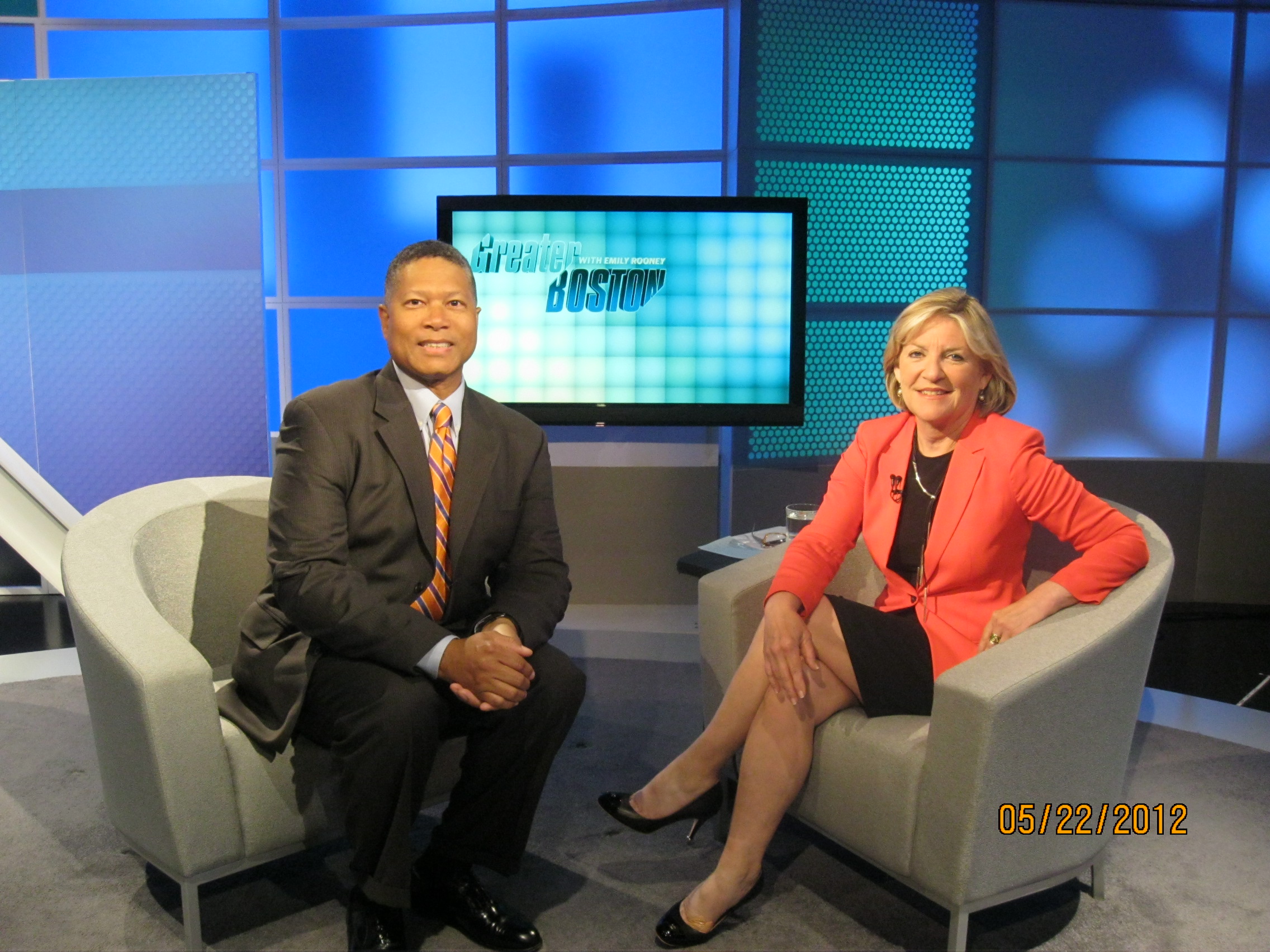 Randal has also been asked to share his vision for the future of FSGB and its programs. Emily Rooney of WGBH invited Randal to appear on both her radio program and her television show, Greater Boston:
Randal has also been asked to share his vision for the future of FSGB and its programs. Emily Rooney of WGBH invited Randal to appear on both her radio program and her television show, Greater Boston:
The Emily Rooney Show
WGBH
Randal has most recently been mentioned by Boston.com for his outstanding community leadership.
Boston.com
Randal remains humbled and honored by this award and truly believes that this recognition is for all those who work at FSGB and make a difference in the lives of the children, youth and families that are served everyday. He will continue to forge partnerships that benefit the most vulnerable members of our communities. As Randal stated, "I am a firm believer that the best and most enduring solutions to advancing civic, social and community development are realized in the transparent and trusting cross pollination of new ideas, partnerships and resources between non-profit community service providers, public systems, foundations, corporations and community participants".
To learn more about the programs offered at FSGB, please visit http://www.fsgb.org/programs.htm
- - - - - - -
Posted Wednesday, May 2, 2012
Randal Rucker, CEO of Family Service of Greater Boston, has been chosen as the recipient of The Peter B. Goldberg/ARAMARK Building Community Leadership Award.
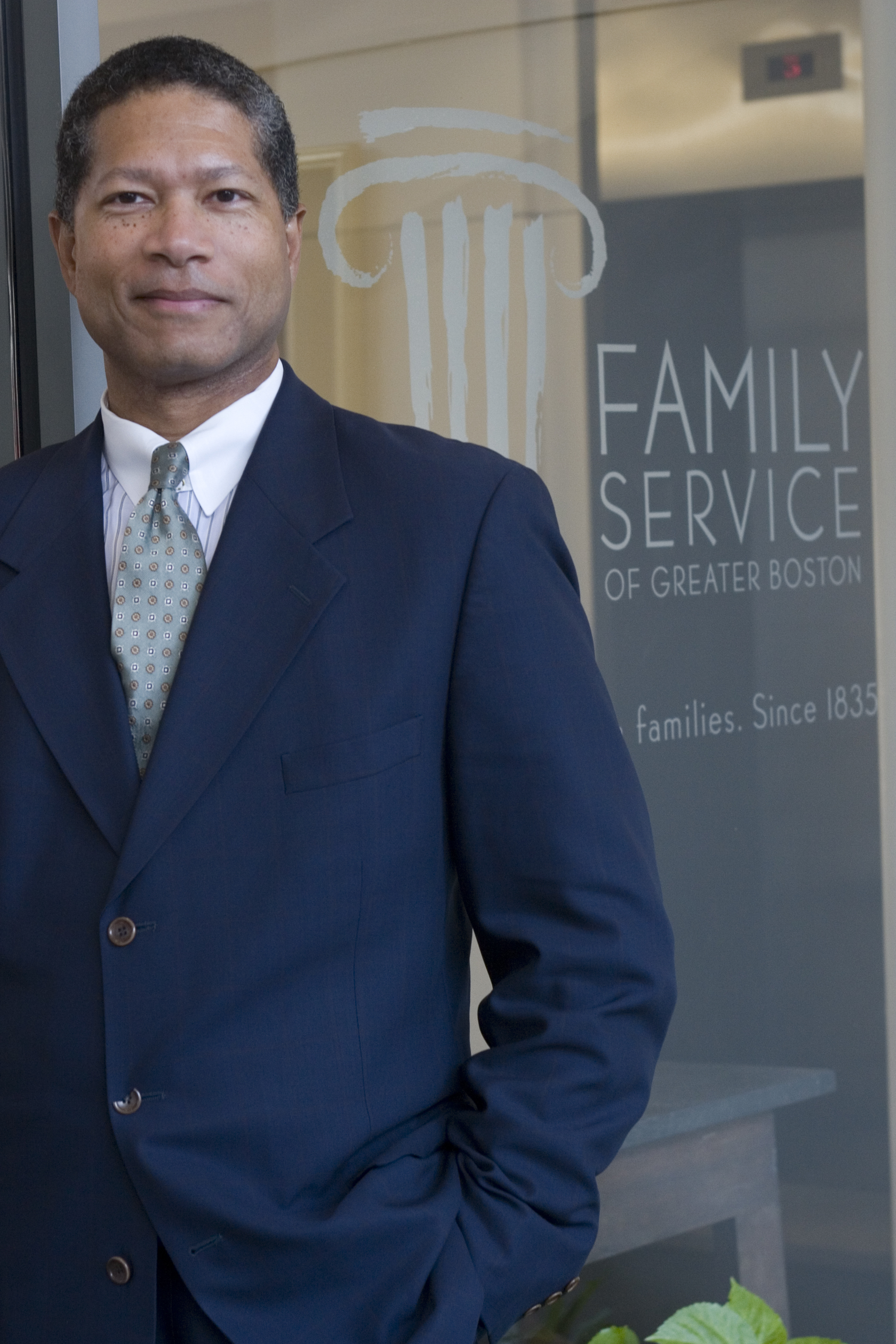
The award is named for the late Peter B. Goldberg, president and CEO of Families International (FI) from 1994 to his death on August 12, 2011. He was also President and CEO of the Alliance for Children and Families and CEO of United Neighborhood Centers of America (UNCA).
Peter believed that executive leadership was a critical part of a high performing nonprofit organization. He was instrumental in the creation of this award and was passionate about its recognition of the role that community leadership can play in revitalizing neighborhoods.
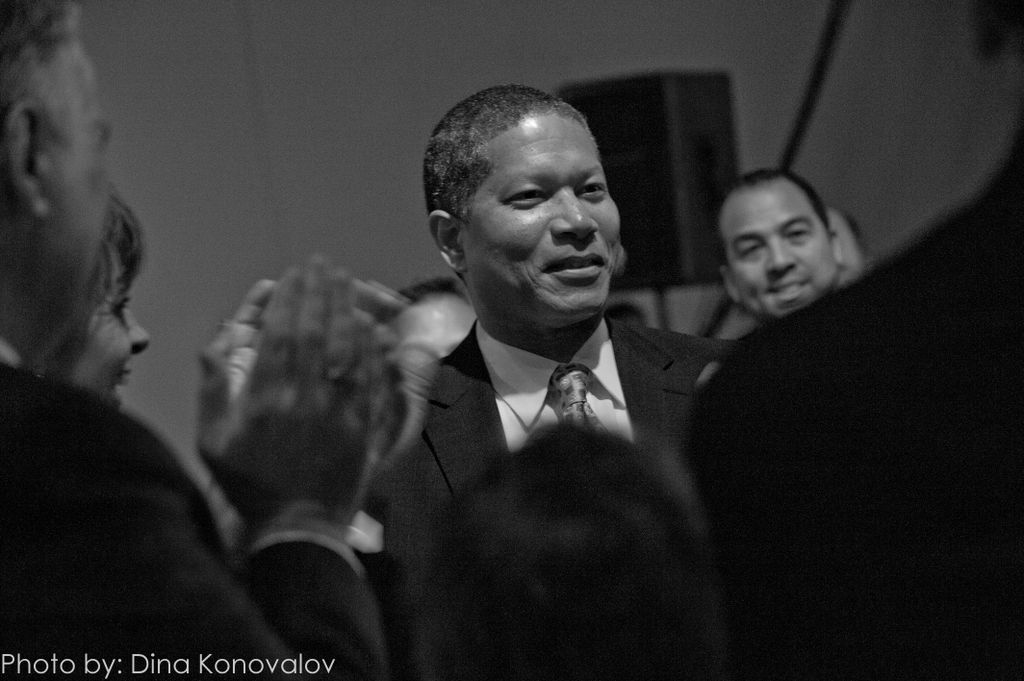 "I am truly honored and humbled to be the recipient of the 2012 Peter B. Goldberg ARAMARK Building Community Executive Leadership Award. This award is especially meaningful as it incorporates the legacy and vision of the extraordinary Peter Goldberg--a dynamic catalyst for continual excellence and innovation in the non-profit human service and community service field" said Randal Rucker.
"I am truly honored and humbled to be the recipient of the 2012 Peter B. Goldberg ARAMARK Building Community Executive Leadership Award. This award is especially meaningful as it incorporates the legacy and vision of the extraordinary Peter Goldberg--a dynamic catalyst for continual excellence and innovation in the non-profit human service and community service field" said Randal Rucker.
 A great sign of leadership is the way Randal is respected by his peers. That respect became even more evident during the nomination process for this award. Randal was nominated by 20 of his peers to who value the work he does and understands its value to the greater community. Of those 20 nominations one was submitted by the Mayor of Boston, The Honorable Thomas M. Menino. "I nominate Randal for his selfless mission to make better communities and stronger families. Randal knows that he alone will not make a change, but when he works with others in his community, teaching them, learning from them and working alongside them, change is possible and then will be sustainable."
A great sign of leadership is the way Randal is respected by his peers. That respect became even more evident during the nomination process for this award. Randal was nominated by 20 of his peers to who value the work he does and understands its value to the greater community. Of those 20 nominations one was submitted by the Mayor of Boston, The Honorable Thomas M. Menino. "I nominate Randal for his selfless mission to make better communities and stronger families. Randal knows that he alone will not make a change, but when he works with others in his community, teaching them, learning from them and working alongside them, change is possible and then will be sustainable."
Randal leads with passion which makes others truly engaged and invested. He inspires others to become a part of his vision by leading with integrity, honesty and a sincere desire to see others succeed. He is encouraging to all and leads with a clear and direct vision for the organization which will lead to better communities and healthy families. Today, Family Service is a model example of a nonprofit that combines traditional social services with community center goals and ideals. Randal’s ingrained values of civic duty, collaboration, and a deep commitment to families and the Boston community drive the organization’s work, both locally and regionally.
Randal is a true neighborhood champion and is valued for his ability to bring together his team, public officials and the private sector to benefit Boston’s most at-risk children and families. He is widely respected for his more than 24 years of commitment to driving change on the regional and national levels and pioneering efforts that encourage responsible fatherhood and urban youth character, build partnerships to help children thrive and forge new paths for strengthening vulnerable communities.
Please join us in congratulating Randal on this wonderful accomplishment. Share your thoughts on Facebook.
To learn more about this award, and why Randal was chosen, please visit the ARAMARK Building Community website.
- - - - - - -
Posted Thursday, February 9, 2012
Teen Violence
By: Desyree, 15
YouthAim! participant
 Violence among the youth increases throughout the years. If they don’t know any better, teens tend to become violent. Violence becomes the only thing they know. They haven’t adapted to any other way to resolve their issues because they have no one teaching them how to. I feel that all violence is the result of human beings believing that their pain and sorrow is more important than everyone else’s sadness. One out of every ten teens will commit a violent act.
Violence among the youth increases throughout the years. If they don’t know any better, teens tend to become violent. Violence becomes the only thing they know. They haven’t adapted to any other way to resolve their issues because they have no one teaching them how to. I feel that all violence is the result of human beings believing that their pain and sorrow is more important than everyone else’s sadness. One out of every ten teens will commit a violent act.
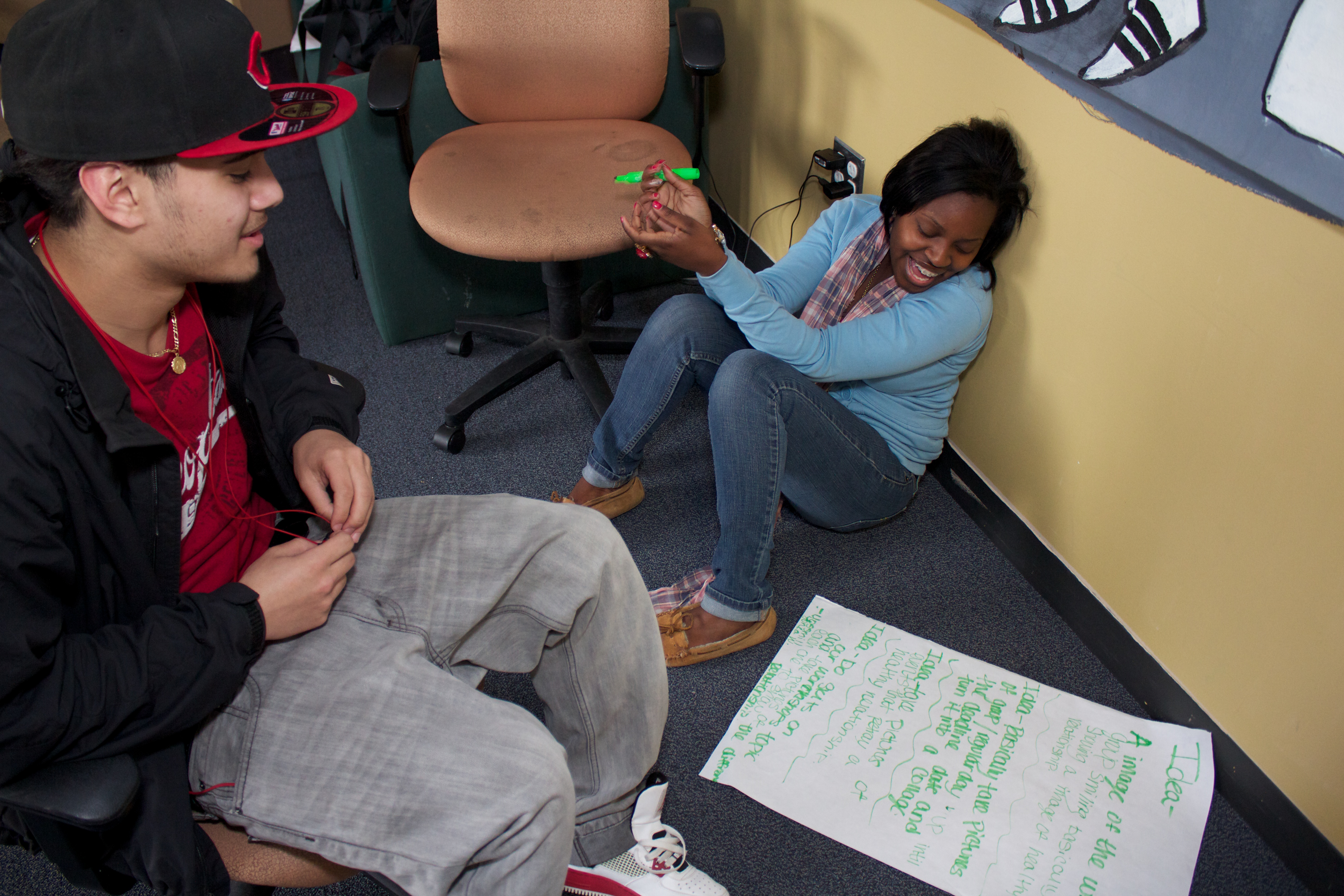 Many teens experience fear and violence. Each day is a battle to survive in a frightening and dangerous world.
Many teens experience fear and violence. Each day is a battle to survive in a frightening and dangerous world.
I am one of the lucky ones. I have found a place that every teen has been looking for; a place they can call their own and know they are safe. YouthAim! is an environment where you have no fear and your opinions always count. You are never turned down in any way. It’s a very open minded place where you can be yourself, feel comfortable and build your confidence. I am so grateful for all I have learned through this program. I can pass all this along to my friends. I hope I am making a big change is my community so it can be a better place for the next generation.
To learn more about YouthAim! please call 617-523-6400 or watch our video here.
- - - - - - -
Posted Monday, January 23, 2012
Success in 2011
Despite the obvious struggles affecting the human service sector in recent years, I'm quite proud of what Family Service accomplished in 2011. There is much to celebrate, and I'd like to share some of the highlights.
In the Family Independence Teen Living Program™, ten mothers were placed in permanent housing, six completed education programs, and two became advocates, sharing their stories to spotlight teen parenting and homelessness. For program participants, year-end was marked by celebration, thanks to generous donors, who shared their bounty with moms and their children.
Strong Start™, based in our Center for Behavioral Health (CBH), expanded and hired a PhD level Early Childhood Education Specialist, Deborah Abelman. You may recognize her from this blog section. She often provides really insightful and educational articles. Strong Start will expand again in 2012. We also expanded CBH's school based counseling to two new Boston schools. We are making such significant strides in addressing the needs of public school children.
We were pleased to attend the 25th graduation of our Effective Black Parenting program. This event celebrated the graduates' accomplishments, as well as ten years offering this "best practice" parenting program at Family Service. Our Family Based Services department served 900 children, youth, and families in home-based intervention and parenting groups in 2011 alone—a notable accomplishment. We take pride in staff continuity, and I want to note that two staff members, Em Kessler and Srila Subash, celebrated 18 years of service the past year.
Family Service received unconditional, national re-accreditation by the Council on Accreditation—a "good housekeeping" seal of approval—and the Teen Living Program had its license renewed. Both of these prove what we already know- Family Service of Greater Boston is a human service agency unparalleled in the field. In order to remain at the top, we've also implemented a new program outcome measurement system, Efforts to Outcomes.
Our annual Family Legacy Gala in October celebrated a year of accomplishments. What a night! The event was a great success and we were honored that so many supporters gave so much, for many that have so little. We were delighted to honor Drs. Carolyn and Eli Newberger for their tireless commitment to the mental health of our community's families, and we look forward to welcoming them back to this year's gala to present the award to the next recipient.
Our Board of Trustees remains committed to all we do here at FSGB, and in the coming weeks we will be adding some brilliant additions to this already inspiring team. Our staff is made up of the most talented and dedicated in the field. Through their work, everyday, they can see the good that is happening in our communities.
Finally, I am humbled by the generous donors who gave so much in 2011. This is a difficult economic time for all of us, so your donations signify your deep commitment to better our community. I am looking forward to a bright and inspiring 2012. With your continued support, we can help families be families.
Sincerely,
Randal Rucker
- - - - - - -
Posted Monday, December 19, 2011
We must remember that children have had only a few experiences in their short lives compared to an adult's millions of experiences". So simple, yet easily forgotten. Read on to learn more about supporting a child's development through communication and repetition from Deborah Abelman, Ph.D.
Supporting Children's Development #1
by Deborah Abelman, Ph.D.
 Every Behavior is a Communication:
Every Behavior is a Communication:
It is our responsibility as educators and caregivers to accurately interpret children's behavior, to respond accordingly, and if necessary, to teach the socially acceptable way to communicate needs, wants, and ideas.
Children learn through imitation, repetition, experimentation, repetition, practice, exploration, repetition. In teaching the words for them to use we are simply giving them a symbolic representation of concrete actions, in order to provide a common system in which to communicate. We are naming for them what we see happening using our own interpretation (based on our own past experiences and understanding) of the situation. What words we are teaching children to use for a given situation is based on how we see the situation, which may be very different from how others, including the child, see the same situation. The child then has to make sense of the world and the system of communication through numerous encounters with others who use either the same or different words in situations which to the child may be the same, but to the different adults may have slight degrees of differences based on each adult's understanding, experiences, and point of view. The child must take in and make sense of all of this in order to develop a conceptual understanding of the relationship between language, behavior and abstract concepts.
We must remember that children have had only a few experiences in their short lives compared to an adult's millions of experiences. They are also just learning how to take in and make sense of each experience in order to figure out how to behave in any given situation. Adults have had years of practice (repetition) doing this.
When we say to children "I've told you hundreds of times…" or "I told you five minutes ago (or this morning or yesterday, etc.)…" or "You should know by now…" we are inappropriately expressing our own feelings (usually of frustration and/or anger) and forgetting what we know about child development. This can feel disrespectful and demeaning to the child. Children who hear these phrases repeatedly may develop low self-esteem because they feel at fault for not being able to do something which they are not developmentally capable of doing.
Adults should follow the same classroom rules as children:
If we want children to behave in certain ways, then we have to show them how by our actions and words, every single moment we are with them. Children see everything we do and will copy us. If, for example, we sit on a bookcase or window sill, they will sit on the bookcase or window sill. They are not doing this to be defiant; they are trying to learn what acceptable behavior is. And we have to remember that it takes a lot of repetition (practice) for children to learn the acceptable behavior.
Showing children how to express their emotions:
Adults should be models for children. We can model how to express emotions. If we are angry we can let children know in a calm manner. We can tell them in an even voice and calm body language
"I'm angry because I can't find the paints. I'm going to take a deep breath and count to three to help me feel better. Then I'll look for the paints."
Whatever you need to do in order to handle your emotions, it is important to let children know by telling them how you feel and how you cope with those feelings and then following through on what you have said and showing them. Children are looking to us to see how to behave.
When children are expressing their emotions inappropriately:
There are many reasons why children act out and express their emotions inappropriately. It could be because the child's internal system of self-regulation doesn't work properly or because the child is imitating others or the child is trying different ways to behave in order to figure out what is acceptable behavior. Regardless of the reason, there are ways to react and help children to learn and develop acceptable behaviors.
We should always validate children's feelings, regardless of age. We can say to a child in a calm, supportive manner:
"You seem mad (upset; frustrated; angry; etc.). That's okay to be mad (upset; frustrated; angry; etc.)."
By doing this we are telling them that we understand and acknowledge their emotions. We are telling them that it's okay to have these feelings. We are also giving them the language to learn how to express their emotions. Even infants, although they may not understand the words, understand the supporting tone and calm body language. By repetition, over time, they will learn to understand the words. (This is one of the ways young children learn language.)
A way to help children learn how to express their emotions appropriately is to help them work through whatever is happening in the moment. A child, for example, who is having a conflict with another child may act aggressively and hit the other child. We can say to that child:
"You seem mad (upset; frustrated; angry; etc.). That's okay to be mad (upset; frustrated; angry; etc.). But let's find a safe way for you to tell us how you're feeling."
We might ask the child why she hit her "friend" and the child might give an answer such as "I wanted the car." or "He's not my friend." When the child is able to respond seemingly appropriately to why she did what she did, we are assuming that she has a conceptual understanding of her behavior, when she may simply be imitating the language she has heard from previous similar experiences. This is one of the ways children try to make sense of and connect experiences in order to learn appropriate behaviors.
When children are expressing their emotions appropriately:
In order for children to learn socially acceptable ways to behave we need to let them know when they are behaving appropriately. For example, if a child's tower has been knocked down by another child, we can say:
"I see that made you mad when she knocked down your tower. But you used your words and told her you didn't like that. You know how to use your words when you're mad."
It is important to validate emotions and let children know it's ok to have these emotions, even when the child knows how to behave appropriately. This lets the child know that you respect them regardless of their feelings. It is also important to catch them, as much as possible, doing the right thing. This reinforces the learning process. By telling them that they know how to behave appropriately, instead of that you like how they are behaving, you are helping them to build internal motivations, instead of learning how to do things just to please others.
Resources
Clemens, S.G. (1983). The Sun's Not Broken, A Cloud's Just in the Way: On Child-Centered Teaching. Maryland:Gryphon House
Katz, L.G. & McClellan, D.E. (1997). Fostering Children's Social Competence: The Teacher's Role: Volume 8 of the NAEYC Research into Practice Series. Washington, D.C.:National Association for the Education of Young Children
Center on the Social and Emotional Foundations of Early Learning (CSEFEL)
Massachusetts Department of Early Education and Care (EEC)
National Association for the Education of Young Children (NAEYC)
- - - - - - -
Posted Wednesday, December 14, 2011
Deborah Abelman, Ph.D.
Deborah Abelman from our Strong Start program is back to discuss "raise you hand" techniques. can three, four and five year old be expected to raise their hand before speaking in preschool? Read on to learn some helpful tips.
"Raise your hand please!"
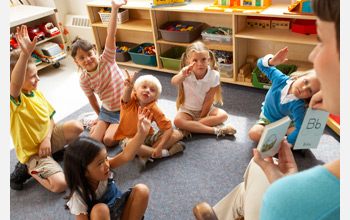 In many early education and care classrooms teachers are expecting young children to raise their hands in order to have a turn to talk. Yet it is not developmentally appropriate to ask three, four, and five year olds to raise their hands before they talk. Requiring young children to raise their hands in order to speak can be extremely confusing for the children. They are concrete thinkers. When a child hears an adult say "Raise your hand if you want to talk." the child may raise his hand and then begin speaking. The child has interpreted the adult's statement to mean that in order for him to talk first he must raise his hand and then he can talk.
In many early education and care classrooms teachers are expecting young children to raise their hands in order to have a turn to talk. Yet it is not developmentally appropriate to ask three, four, and five year olds to raise their hands before they talk. Requiring young children to raise their hands in order to speak can be extremely confusing for the children. They are concrete thinkers. When a child hears an adult say "Raise your hand if you want to talk." the child may raise his hand and then begin speaking. The child has interpreted the adult's statement to mean that in order for him to talk first he must raise his hand and then he can talk.
A young child is egocentric and sees the world revolving around him. Even when the adult says "Raise your hand if you want me to call your name so you can talk." the young child will expect to hear his name as soon as his hand is raised. It's as if you made the statement to that child only. And if that child is not called on immediately he may either withdraw within himself or act out. If, over time the child is rarely or never called when he raises his hand, he may lose trust in the adult. After all, the adult told him he'd be called on if he raised his hand, and yet his experience is that most of the time it doesn't happen.
Kindergarten teachers may require children to raise their hands to talk.
But three, four and five year olds are in preschool, they are not in kindergarten.
It is the responsibility of the kindergarten teacher to help the children in his class learn about raising hands. Preschool teachers can prepare children for kindergarten requirements such as raising hands, but we do not prepare to do something by doing it.
Raising hands is a way to control turn-taking. Young children are just beginning to master the skill of turn-taking. Games such as "Who took the cookie from the cookie jar?" "Duck, Duck, Goose," and "The Wonder Ball" are all games which help children learn how to take turns. Board games such as "Candyland" and "Chutes and Ladders" are also games which help children learn to take their turn.
During group activities such as circle time it is important that children learn how to "wait their turn to talk." One way to help children do this is by using a "talking stick" (or ball, teddy bear, toy car, or any other object). The rule is simple and concrete. In order to talk the child or adult must be holding the "talking stick" quietly in his lap. If you don't have the "talking stick" quietly in your lap, then it's not your turn to talk. The teacher starts out with the "talking stick" in his lap. He then chooses which child has the "talking stick" next. When that child is done talking, the teacher can tell the child who to give the "talking stick" to or he can let the child choose. If he allows the child to choose who is next, then he must be sure all children get a chance to choose until that activity is over and the "talking stick" goes back to the teacher.
When a "talking stick" is being used all the children can see who has it and whose turn it is to talk. It can also reduce power struggles because it takes the focus away from the teacher or child and puts it on the rule of the "talking stick." It is "The rule is only the person with the 'talking stick' can talk." instead of "I told you it's not your turn to talk." If the rule is posted in the circle area (a picture of a child holding a "talking stick" and talking) then all the teacher has to do is point to the picture and remind the children about the rule. When a child has learned how to "wait his turn to talk" using a "talking stick" during his preschool years, he is ready to quickly learn how to raise his hand and wait to be called on when he gets to kindergarten or first grade.
Resources
Clemens, S.G. (1983). The Sun's Not Broken, A Cloud's Just in the Way: On Child-Centered Teaching. Maryland:Gryphon House
Katz, L.G. & McClellan, D.E. (1997). Fostering Children's Social Competence: The Teacher's Role: Volume 8 of the NAEYC Research into Practice Series. Washington, D.C.:National Association for the Education of Young Children
Center on the Social and Emotional Foundations of Early Learning (CSEFEL)
Massachusetts Department of Early Education and Care (EEC)
National Association for the Education of Young Children (NAEYC)
Thank you to all the early education and care providers with whom I have I have worked and consulted, and the students I have taught, for the many activity ideas you have shared with me over the years
- - - - - - -
Posted Tuesday, October 25, 2011
Mary Moore, Boston Business Journal, April 22-28, 2011
Mercantile: Small banks do a lot under the radar
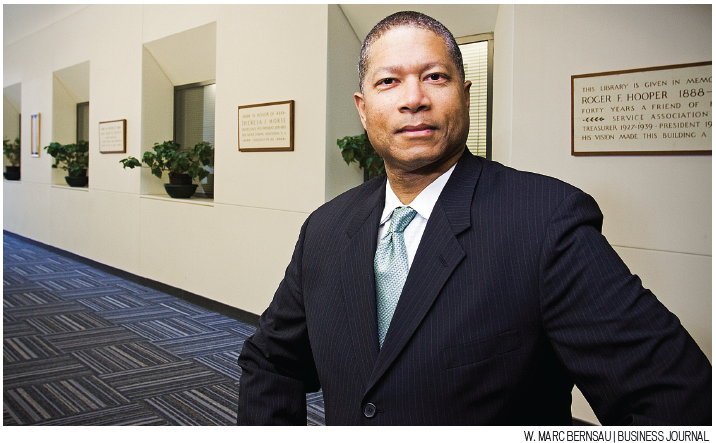
Randal Rucker heads Mercantile Bank's social responsibility committee.
So important is the bank's charitable giving to Charles Monaghan, president of Mercantile Bank, that when he saw a chart in the Chronicle of Philanthropy detailing the 2009 donations from Bank of America, State Street Corp., Citigroup, JP Morgan Chase & Co. and the like, he decided to run his own numbers.
In 2009, Mercantile donated $39,747 compared with, say, Bank of America's $209 million and State Street Corp.'s $20 million. Peanuts in real dollars, but as a percentage of net income, Monaghan found, Mercantile Bank gave 3.85 percent in 2009 while Bank of America gave 3.33 percent and State Street gave 1.10 percent.
In 2010, Mercantile Bank's contributions dropped to 3.26 percent of net income, but the dollar amount of giving increased, according to Monaghan's calculations, though he declined to provide specifics. Mercantile Bank has $167 million in assets and 36 employees with branches in the South End, Fenway and Brighton, according to its filings.
"Bank of America gives millions and gets on the front page. Community banks give thousands and get nowhere. But if you measure it by the revenue, we do a better job," said Monaghan, who joined Mercantile Bank, which is privately held, a decade ago.
A Bank of America spokesman said that local giving "isn't about competition or publicity, it's about addressing the most pressing needs of our communities. Companies of all sizes continue to make a real difference in Boston, and for that we should all be proud."
Monaghan launched the bank's social responsibility committee eight years ago, a group that includes bank staff at all levels, from directors to tellers, to make decisions about where the bank's charitable dollars go. Bank employees have an open invitation to attend and participate.
Mercantile centered its early charitable work around financial literacy, which included a volunteer program for bank employees who would work with students on budgeting, checkbooks and getting credit. In 2009, when the economy was plummeting, the committee revised its giving guidelines and changed directions, focusing more resources on organizations meeting immediate needs, such as food and housing. The social responsibility committee has received about 50 requests a year since 2009 and has supported roughly 15 nonprofits with grants ranging from $2,000 to $10,000, said Randal Rucker, a Mercantile Bank director and chairman of the social responsibility committee. Rucker also is the CEO of Family Services of Greater Boston.
Mercantile typically makes multiyear grants to these nonprofits, Rucker said. His own nonprofit has received financial support from Mercantile Bank for a teen mothers residential program and a youth leadership program.
Another nonprofit that receives support from Mercantile Bank is Project Place, which provides job training and housing for homeless individuals, as well as helping them start new businesses. Members of the bank's staff teach financial literacy to the organization's beneficiaries, and anyone who graduates from the financial literacy program is eligible for a bank account with Mercantile.
"Most of our folks go to check-cashing places. They have bad credit," said Suzanne Kenney, executive director. "Mercantile is giving them a fresh start. They take a chance on our folks."
And two months ago, with $10,000 from Mercantile Bank, Project Place bought a $30,000, 15-passenger van to replace the organization's rickety vehicle.
"In my point of view, the community is an equal priority. I could make decisions that are completely beneficial to the shareholders and screw my employees and my community. But I don't happen to think that's a wise choice," Monaghan said.
- - - - - - -
Posted Monday, October 24, 2011
Deborah Abelman, Ph.D. has over 30 years experience in the field of early intervention/early childhood education/special education in both the public and private sectors. She has taught in public preschool special education, private childcare, and mental health programs. She has developed and taught pre-service and in-service courses and workshops for teachers of children from birth through age eight. Her areas of expertise include working with young children with challenging behaviors, classroom management, curriculum, social competency intervention, working with young children from abusive and violent environments, language intervention, working with families, developing collaborative relationships, and policy development. Currently, she works at Family Service full time with her focus being the Strong Start™ Program.
Thoughts on the Use of Electronic Media with Young Children by Deborah Abelman, Ph.D.
 The Fred Rogers Center for Early Learning and Children's Media is working with the National Association for the Education of Young Children (NAEYC) to revise NAEYC's position statement on technology. The American Academy of Pediatrics (AAP) has revised it's policy statement, "Media Use by Children Younger Than Two Years," and released it on Tuesday, October 18th at the AAP National Conference and Exhibition in Boston. It will be published in the November 2011 issue of Pediatrics (published online October 18). These groups have recognized that the rapid changes in the development of electronic media have caused a change in the way we are using these devices. They also realize that the research on the effects, particularly on young children, lags behind the development of updated and new devices and programs.
The Fred Rogers Center for Early Learning and Children's Media is working with the National Association for the Education of Young Children (NAEYC) to revise NAEYC's position statement on technology. The American Academy of Pediatrics (AAP) has revised it's policy statement, "Media Use by Children Younger Than Two Years," and released it on Tuesday, October 18th at the AAP National Conference and Exhibition in Boston. It will be published in the November 2011 issue of Pediatrics (published online October 18). These groups have recognized that the rapid changes in the development of electronic media have caused a change in the way we are using these devices. They also realize that the research on the effects, particularly on young children, lags behind the development of updated and new devices and programs.
An October 18, 2011 article, Trying to gauge the impact of growing up digital, on the Boston Globe's website, boston.com, reported some startling statistics on the use of electronic media by young children. The article states that "Six percent of 2- to 5-year-olds have their own smartphone, according to a report this month from Play Science, a research firm in New York."
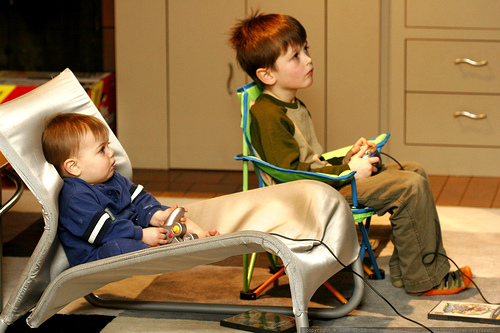 The article also reports that "72 percent of the 100 top-selling education apps in Apple's iTunes App store this year were aimed at preschoolers and those in elementary school." and that Fisher-Price is selling a "$15 Laugh & Learn Apptivity Case, an oversize iPhone case that doubles as a baby rattle."
The article also reports that "72 percent of the 100 top-selling education apps in Apple's iTunes App store this year were aimed at preschoolers and those in elementary school." and that Fisher-Price is selling a "$15 Laugh & Learn Apptivity Case, an oversize iPhone case that doubles as a baby rattle."
According to the AAP a recent survey showed that 90 percent of parents said their children under the age of two years watch some form of electronic media on average one to two hours per day. By the age of three years, almost one third of children have a television in their bedroom.
The survey also noted that parents who believe that educational television is "very important for healthy development" are twice as likely to keep the television on all or most of the time.
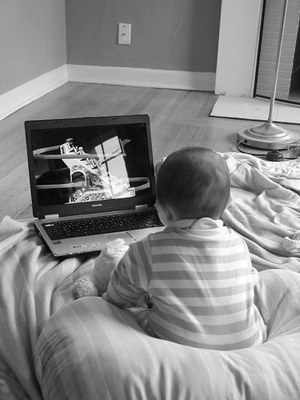 I have a number of concerns with all this. First of all, children are going to lose out on the development of conceptual knowledge, higher level problem solving and critical thinking skills. Young children are concrete thinkers and kinesthetic learners. They learn through all their senses. While they may be able to interact seemingly appropriately with smartphones, I-Pads, computers, and other electronic media, they do not have a conceptual understanding of their actions. They have learned to manipulate these devices through watching others and basic trial and error. And the more time they spend with these devices,the less time they spend in more appropriate types of play.
I have a number of concerns with all this. First of all, children are going to lose out on the development of conceptual knowledge, higher level problem solving and critical thinking skills. Young children are concrete thinkers and kinesthetic learners. They learn through all their senses. While they may be able to interact seemingly appropriately with smartphones, I-Pads, computers, and other electronic media, they do not have a conceptual understanding of their actions. They have learned to manipulate these devices through watching others and basic trial and error. And the more time they spend with these devices,the less time they spend in more appropriate types of play.
When children play with blocks they become problem solvers as they try to figure how to balance one on top of the other. They follow mental plans as they build roads and bridges, houses and other buildings. They are learning math concepts as they make squares and rectangles using long and short blocks. When they play in the sand or water table they are experimenting and learning about making generalizations about the properties of objects.
When children play in the dramatic play area they are learning how to cooperate and take turns. They are learning about symbolic representation, an important concept in the development of language and literacy skills.
When children use crayons, paints, and pencils, when they string beads and put pegs in pegboards or play with legos they are developing their fine motor skills, eye-hand coordination, and learning how to organize and conceptualize the world. When children are provided opportunities to run and jump and climb and swing and play ball and ride bikes they are developing their motor skills, social/emotional skills, language skills, and cognitive skills.
What skills are children developing when they use smartphones, I-Pads, computers, and other electronic media? Some experts might say that they are learning problem solving and critical thinking skills, but I would argue that they may be learning basic problem solving such as simple cause and effect – if I push this button, that happens – but they are not learning why that is happening or even how to figure out the why. They are not learning that, for example if I push this button, that happens and if I push that button, something else happens, and if I push both buttons I can create something new. (They may chance upon the something new by accident, but they may not be able to make the connection as to why pushing both buttons makes it happen.)
Secondly, we do not know what kind of effect, both short-term and long-term, the new programs are having on children. We have learned, for instance, that shows such as Sponge Bob can affect young children's attending skills due to the quick changes from one scene to another. Studies have also shown that video watching does not enhance young children's language development (and may even be detrimental). According to the AAP, the use of what they term "passive entertainment" can be harmful. Furthermore, we know that cell phones can cause cancer in adults due to the waves used to carry the signal. Can you imagine the effect it can have on the developing brain?
Thirdly, while we'd all like to believe that families are using these devices together, this isn't necessarily what is happening. A recent survey study by the Kaiser Foundation found that, in a typical day, 83% of children under six use screen media. Of these children who spend some time with media, 40% of parents watched TV with their children every time their children watched, 38% of parents used computers with their children every time their children did, and 26% played video games with their children every time they played.
What is happening, for example, to those 62% of children who are on the computer two or more hours a day without parental guidance and contact? Certainly not healthy attachment and bonding opportunities with primary caregivers which in the early years is critical for healthy social/emotional development.
Finally, there's the argument that young children need to know how to learn how to use these devices or they will lag behind their classmates when they become school-aged. I tell teachers that we don't prepare children for the next level by doing the required skills of that level. There are pre-requisite skills needed before children are developmentally ready. And those children who have been given ample opportunities to hone those pre-requisite skills will ultimately surpass their classmates in their knowledge and skills.
Resources
Farrell, M.B. (2011). Trying to gauge the impact of growing up digital. www.boston.com. October 18, 2011.
Ginsburg, K.R. (2007). The importance of play in promoting healthy child development and maintaining strong parent-child bonds. Pediatrics, 119:1, January 2007.
Kirkorian, H.L., Wartella, E.A., and Anderson, D.R. (2008). Media and young children's learning. Future of Children, 18:1, Spring 2008.
Rideout, V., Hamel, E. and the Kaiser Family Foundation (2006, May). The Media Family: Electronic Media in the Lives of Infants, Toddlers, Preschoolers and their Parents. Menlo Park, California: Henry J. Kaiser Foundation
www.aap.org – The American Academy of Pediatrics' website
www.fredrogerscenter.org – Fred Rogers Center for Early Learning and Children's Media website
www.futureofchildren.org – The Future of Children's website
www.naeyc.org – The National Association for the Education of Young Children's website
- - - - - - -
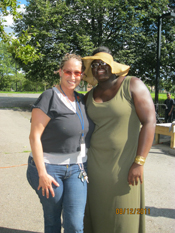
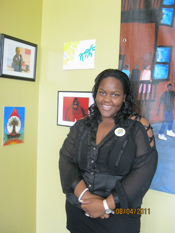


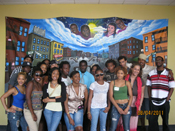

Posted Monday, August 29, 2011
Nicole Rodriguez is the supervisor of the YouthAim!™ program here at Family Service. YouthAim! is a year-round youth leadership and development program. The program focuses on vulnerable teens at a critical, formative life stage by providing them skills necessary to make good decisions and protect themselves from harmful behavior.Recently, 19 participants of YouthAim!’s summer program completed three community service projects in 6 just weeks!
After selecting three different summer community service projects, dividing into teams and brainstorming their goals, YouthAim! participants planned and executed a successful summer of service.
Teams worked together to organize a sports camp for children 8-12 years old, twice weekly; an art gallery featuring art created by youth, highlighting violence prevention and building healthy relationships; and a local Community Day that targeted youth and families for a day of activities like tug of war, face painting, rope jumping, a basketball shootout contest, barbecuing, music and on-stage youth performances in an amphitheater. Over 100 youth and families attended Community Day! In collaboration with the Bromley TMC, YouthAim! transformed an ordinarily desolate park into a day of peace, unity and fun!
Throughout this summer of service, YouthAim! participants learned important job and life skills, including goal setting, planning and organizing, public speaking, project management, problem solving and budgeting. Through the accomplishment of the goals they set, they experienced success as the result of their own efforts. In addition, they built relationships with other youth and practiced giving and receiving peer performance feedback regularly.
It’s hard to imagine, but they even found time to take a day off and go to Six Flags Amusement Park to celebrate their accomplishments. Thank you to all of our collaborators, including ABCD SummerWorks, Bromley Tenant Management Corporation, Mass Department of Children and Families and to the kind donors who continue to support our efforts to create constructive out-of-school learning opportunities.
To learn more about YouthAim!, or other programs offered at Family Service, please call 617-523-6400.
- - - - - - -
Posted Friday, August 26, 2011
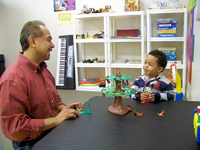
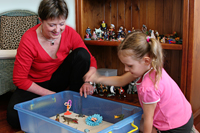 Katherine V. Canavan, LICSW is an Early Childhood Mental Health Specialist & Supervisor at Family Service of Greater Boston.Here she describes the benefits of play therapy and the effect that the outcome can have on the family as a whole.
Katherine V. Canavan, LICSW is an Early Childhood Mental Health Specialist & Supervisor at Family Service of Greater Boston.Here she describes the benefits of play therapy and the effect that the outcome can have on the family as a whole.
Maria’s* mother was at her whit’s end. As a single, full time working mother, she needed Maria to be in daycare so she could work. But Maria was having behavior problems at daycare and the daycare was frequently calling mother at work. Mother was unable to leave work to pick up Maria when she was hitting or biting her classmates. Mother was concerned how the constant phone calls from the daycare were impacting her job that she needed to keep in order to provide for her family. Mother was also worried about Maria losing her daycare.
Maria was referred to me for play therapy which I provided at her daycare. This meant that I could work more closely with her teachers and also work with her in her classroom. In individual play therapy I was able to help Maria learn to identify her feelings (feeling jealous) that cause her to behave badly (hit her friend). By working with Maria in her classroom I was able to coach her through situations where her feelings were overwhelming to her. I helped her to label her feelings, calm down and problem solve instead of hitting or kicking.
We also worked on helping her to see the causes of her aggression (her friend crying) and develop empathy for others by looking at her friends’ faces to learn the cues of how they were feeling. By working in the classroom with Maria I also modeled to her teacher’s techniques that they can use to better support Maria’s progress. I also worked with mother in helping her to develop a better evening routine with Maria and be less of a peer and more of a parent.
By providing play therapy to Maria, working with mother to change how she was parenting Maria, and working with Maria’s teachers to better understand and respond to her behavior, Maria is making excellent progress. The number of aggressive incidents at her daycare has decreased substantially as have the number of phone calls from the daycare that mother receives. Maria and mother are both doing very well.
For more information on play therapy and its’ benefits, or other programs offered at Family Service, please call 617-523-6400.
- - - - - - -
Posted Thursday, August 25, 2011
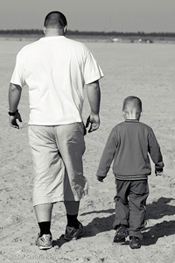 Warren Ivey, LMHC, CAGS is a family counselor and the supervisor of our Helping Fathers be Fathers Program™.This program serves ALL FATHERS; yet targets especially economically disadvantaged, never married, non-custodial fathers between the ages of 16 and 25.
Warren Ivey, LMHC, CAGS is a family counselor and the supervisor of our Helping Fathers be Fathers Program™.This program serves ALL FATHERS; yet targets especially economically disadvantaged, never married, non-custodial fathers between the ages of 16 and 25.
Helping Fathers Be Fathers is a service-based program designed to meet the needs of young fathers; whether it be through education, health care, career services, or just someone to talk to.
Warren has agreed to share some insight into the program in the form of the five principles of responsible fatherhood:
- As a father it is my responsibility to give affection to my children.
- As a father it is my responsibility to give gentle guidance to my children.
- As a father it is my responsibility to give financial support to my children and to the mother of my children.
- As a father it is my responsibility to demonstrate respect at all times to the mother of my children and to my children.
- As a father it is my responsibility to set a proud example for my children by living within the law and without the taint of alcohol or drug abuse.
To learn more about the Helping Fathers Be Fathers Program, or any other program available at Family Service, please call 617-523-6400.
Sign up to learn more about Family Service


